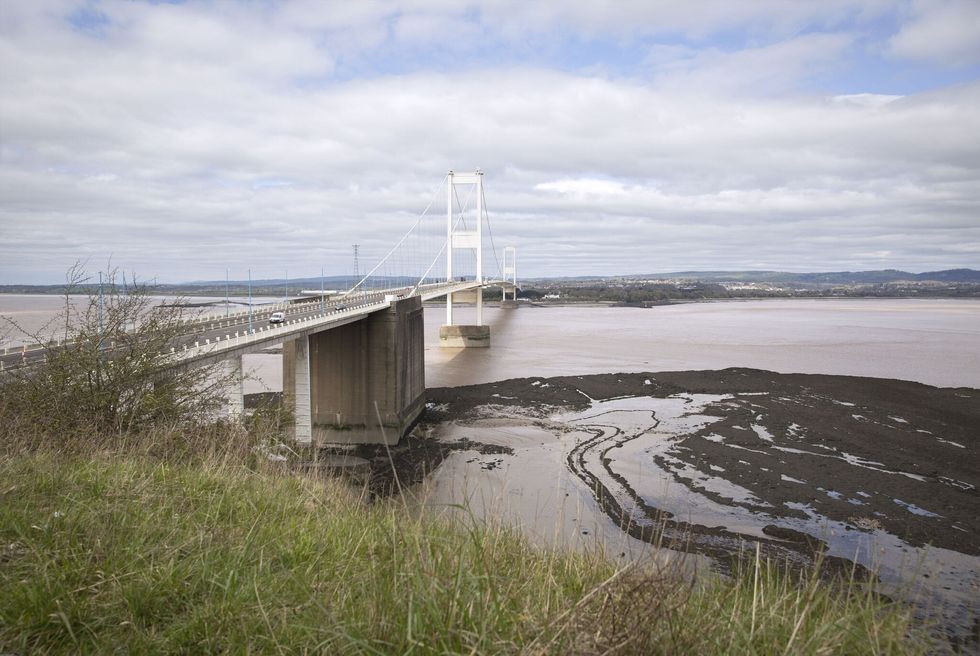



Thousands of Britons have been warned they could face traffic issues after a major travel route closed for the remainder of the year.
It comes after the M48 Severn Bridge was shut to HGVs on May 27, with officials now warning of the impact this could have on local trade.
The ban affects all lorries exceeding 7.5 tonnes, forcing them to divert via the M4 Prince of Wales Bridge, adding 14 miles to their journeys, but if the M4 bridge is shut, National Highways said the diversion route goes approximately 100 miles.
In response, Monmouthshire County Council has expressed concerns that companies in Chepstow might abandon the area due to restricted motorway access.
 PA/NATIONAL HIGHWAYS |
PA/NATIONAL HIGHWAYS |
The restrictions have caused chaos for thousands of businesses and drivers
Local representatives estimate that approximately 2,500 positions in the town face potential disruption from the weight limitations. The restrictions followed a routine inspection that uncovered significant deterioration in the bridge's main suspension cables.
In response, National Highways implemented the ban to prevent further damage to the 59-year-old structure, which has experienced increased strain from heavier modern vehicles and a 34 per cent surge in traffic since the toll was removed in 2018.
The Cardiff Capital Region has now pledged to examine potential solutions to the bridge closure crisis. During a recent committee meeting, members acknowledged the threat extends far beyond Monmouthshire's borders.
Robert Bevan, who leads the body's overview and scrutiny committee, promised to "take the issue up" following concerns raised by local representatives.
 NATIONAL HIGHWAYS | The ban for HGVs will be in place for between 12 and 18 months
NATIONAL HIGHWAYS | The ban for HGVs will be in place for between 12 and 18 months
The Labour councillor emphasised that "time is of the essence, we can't wait" and committed to pursuing immediate action. Meanwhile, Councillor Simon Griffiths argued the situation should become the "top regional transport priority" for the organisation.
The body oversees transport planning, land use and economic development across the region, including participation in the Western Gateway initiative linking South Wales with England's South West.
The weight restrictions threaten vital supply chains for major industries throughout South Wales, according to regional leaders.
Deliveries from the Midlands to automotive and aerospace companies clustered around Severnside and Filton have faced significant delays.
Griffiths warned that "this really could damage any growth we see in South Wales" as businesses grapple with extended journey times.
The additional 26-mile round trip represents approximately 30 minutes of extra driving time for lorry drivers already constrained by legal hours limits and regulations.
Traffic data indicated that most affected lorries have destinations within 30 miles of the bridge, suggesting concentrated local economic consequences.
National Highways has acknowledged that the restrictions will particularly affect regional operations but maintained that no compensation will be offered for disruption under statutory regulations.
 NATIONAL HIGHWAYS | The M48 Severn Bridge carried more than 32,000 vehicles daily last year
NATIONAL HIGHWAYS | The M48 Severn Bridge carried more than 32,000 vehicles daily last year
The weight limitations are anticipated to remain in place for 12 to 18 months while engineers develop interim measures. The 1960s suspension bridge suffered from exposure to harsh marine conditions and wasn't engineered for contemporary traffic volumes or vehicle weights.
Local politicians have expressed frustration over limited Government engagement regarding the bridge crisis. Councillor Armand Watts revealed that cabinet members were given "15 minutes with the junior minister, the minister for future highways, and that's it".
Watts also criticised the South East Wales Trunk Road Agency for remaining silent publicly about the weight restrictions. He complained that a working group had been established "without any elected members to decide our future," leaving Monmouthshire to negotiate independently with the UK Government.
The weight limit has derailed ambitions for Welsh Severnside development to match the economic success across the border. Watts noted that South Gloucestershire and Bristol have created 9,000 jobs in what he termed "an economic hotspot," with opportunities now jeopardised for Welsh communities.
